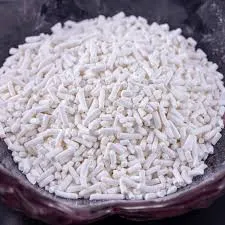
Potassium Sorbate
Potassium Sorbate
What Is It?
Sorbic Acid is a white, free-flowing, crystalline powder. Potassium Sorbate, the potassium salt of Sorbic Acid, occurs as a white crystalline powder, white granules, or pellets. In cosmetics and personal care products, Sorbic Acid and Potassium Sorbate are used primarily in the formulation of facial and eye makeup and skin care and hair products.
Why Is It Used?
Sorbic Acid and Potassium Sorbate kill microorganisms, or prevent or retard their growth and reproduction, and thus protect cosmetics and personal care products from spoilage.
Follow this link for more information about how preservatives protect cosmetics and personal care products.
Potassium Sorbate
Scientific Facts
Sorbic Acid occurs naturally as para-sorbic acid in berries of the mountain ash tree, Sorbus aucuparia, Rosaceae. It can also be synthesized by various processes. Sorbic Acid and Potassium Sorbate have a broad spectrum of fungistatic activity but are less active against bacteria. Optimum antimicrobial activity is attained at pH values up to 6.5.
Safety Information
The Food and Drug Administration (FDA) reviewed the safety of Sorbic Acid and Potassium Sorbate and determined that they were Generally Recognized As Safe (GRAS) as preservatives for direct addition to food. Sorbic Acid and Potassium Sorbate are effective for the control of mold and yeast in cheese products, baked goods, fruit juices, fresh fruits and vegetables, wines, soft drinks, pickles, sauerkraut, and certain fish and meat products. The safety of Sorbic Acid and Potassium Sorbate has been assessed by the Cosmetic Ingredient Review (CIR) Expert Panel. The CIR Expert Panel evaluated the scientific data and concluded that Sorbic Acid and Potassium Sorbate were safe for use in cosmetics and personal care products. In 2006, as part of the scheduled re-evaluation of ingredients, the CIR Expert Panel considered available new data on these ingredients and reaffirmed the above conclusion.
CIR Safety Review: Sorbic Acid and Potassium Sorbate were practically nontoxic in acute oral toxicity studies. In subchronic studies, no significant adverse effects were observed when 10% Sorbic Acid was included in the diet. Sorbic Acid and Potassium Sorbate, at concentrations up to 10%, were practically nonirritating to the eye. Both ingredients at concentrations up to 10% were at most only slightly irritating to skin. Sorbic Acid and Potassium Sorbate have been tested for mutagenic effects using bacterial tests, genetic recombination tests, reversion assays, tests for chromosomal aberrations, sister chromatid exchanges and gene mutations. The weight of evidence of these tests indicates that these ingredients were not mutagenic. Potassium Sorbate at 0.1% in the diet or 0.3% in drinking water for up to 100 weeks was not carcinogenic. In other chronic studies, no carcinogenic effect was demonstrated by Sorbic Acid in diets containing up to 10% Sorbic Acid. No developmental effects have been observed with Potassium Sorbate. Formulations containing up to 0.5% Sorbic Acid and or Potassium Sorbate were not significant primary or cumulative irritants and not sensitizers.
-
Comprehensive Guide to Acetic Acid as Preservative: Benefits, Uses & Future TrendsNewsNov.24,2025
-
What Is a Food Additive? Global Insights, Applications & Future TrendsNewsNov.24,2025
-
968 Sweetener: The Modern Solution for Health-Conscious SweeteningNewsNov.23,2025
-
Discover the Benefits and Uses of 965 Sweetener (Erythritol) | Tenger ChemicalNewsNov.23,2025
-
961 Sweetener - A Next-Gen Sugar Alternative for Health and IndustryNewsNov.23,2025
-
Understanding 960 Sweetener: The Modern Sugar Alternative for Health and IndustryNewsNov.22,2025
-
Everything You Need to Know About 955 950 Sweeteners – Benefits, Uses, and TrendsNewsNov.22,2025
Hebei Tenger Chemical Technology Co., Ltd. focuses on the chemical industry and is committed to the export service of chemical raw materials.
-

view more DiethanolisopropanolamineIn the ever-growing field of chemical solutions, diethanolisopropanolamine (DEIPA) stands out as a versatile and important compound. Due to its unique chemical structure and properties, DEIPA is of interest to various industries including construction, personal care, and agriculture. -

view more TriisopropanolamineTriisopropanolamine (TIPA) alkanol amine substance, is a kind of alcohol amine compound with amino and alcohol hydroxyl, and because of its molecules contains both amino and hydroxyl. -

view more Tetramethyl Thiuram DisulfideTetramethyl thiuram disulfide, also known as TMTD, is a white to light-yellow powder with a distinct sulfur-like odor. It is soluble in organic solvents such as benzene, acetone, and ethyl acetate, making it highly versatile for use in different formulations. TMTD is known for its excellent vulcanization acceleration properties, which makes it a key ingredient in the production of rubber products. Additionally, it acts as an effective fungicide and bactericide, making it valuable in agricultural applications. Its high purity and stability ensure consistent performance, making it a preferred choice for manufacturers across various industries.






